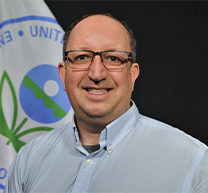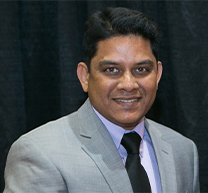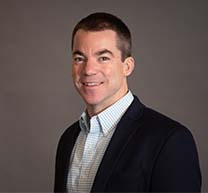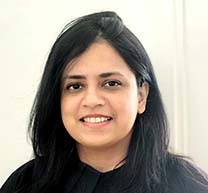شركة GEC في القمة الإلكترونية 2024
قيادة الاستدامة: الجيل القادم من معايير العلامة الإيكولوجية للجيل القادم من EPEAT ومنظورات سلسلة التوريد لأصحاب المصلحة
الأربعاء - 23 أكتوبر - 2:00 - 3:45 مساءً بالتوقيت المحوري
انضم إلى المجلس العالمي للإلكترونيات (GEC) في قمة الاستدامة الإلكترونية في جلسة خاصة حيث سنقدم الجيل التالي من معايير العلامة البيئية EPEAT®. سيتم إطلاق هذه المعايير الجديدة في عام 2025، وستحدد هذه المعايير الجديدة توقعات السوق لاستدامة منتجات تكنولوجيا المعلومات والاتصالات في أربعة مجالات ذات أولوية: تغير المناخ، والدائرية، والمواد الكيميائية، وسلاسل التوريد المسؤولة.
تُعد هذه الجلسة فرصة فريدة للمتخصصين في هذا المجال لاكتساب نظرة ثاقبة مبكرة على المعايير المحدثة والاستماع مباشرةً إلى أصحاب المصلحة عبر سلسلة توريد تكنولوجيا المعلومات والاتصالات. وسواء كنت مشترياً أو مورداً أو معيداً للتدوير، ستتعرف على كيفية تأثير هذه التغييرات على أهداف الاستدامة والممارسات التشغيلية الخاصة بك.
المتحدثون المميزون

كريس نيومان
عالم بيئي، وكالة حماية البيئة، وكالة حماية البيئة

بونيت شريفاستافا
مهندس رئيسي، ديل
ديفيد هيرشلر
رئيس قسم الاستدامة في شركة ERI

بوب ميتشل
الرئيس التنفيذي للمجلس العالمي للإلكترونيات

شاهانا ألطاف، دكتوراه
أجندة الفعاليات
23 أكتوبر 2024
2:00 - 2:10 مقدمة إلى GEC و EPEAT
2:10:2 - 2:40 نظرة عامة على معايير EPEAT المحدثة
2:40 - 3:40 - 3:20 وجهات نظر أصحاب المصلحة حول الجيل القادم من معايير العلامة البيئية EPEAT
3:20 - 3:30 3:30 أسئلة وأجوبة وختام الجلسة الختامية
ستقدم هذه الجلسة رؤى قيّمة حول مستقبل الاستدامة لمنتجات تكنولوجيا المعلومات والاتصالات، مع التركيز على معايير التدوير. وسيتبادل قادة الصناعة وجهات نظرهم حول تحديات التنفيذ والفرص التي تطرحها المعايير الجديدة.
ابق في الطليعة من خلال الانضمام إلينا لاستكشاف كيف سيساعد الجيل التالي من معايير EPEAT في تشكيل مشهد التكنولوجيا المستدامة لسنوات قادمة.
اتصل بنا على criteria@gec.org للأسئلة أو لمزيد من المعلومات.
المزيد عن سيري
ويتمثل دور مبادرة "سيري" في جمع كل هذه الأجزاء المتباينة معاً لإحداث تغيير حقيقي. هذه المنظمة الفريدة من نوعها هي المنظمة التعاونية غير الربحية الوحيدة في العالم التي تضم العديد من أصحاب المصلحة وتركز حصرياً على تقليل المخاطر البيئية والصحية التي تشكلها الإلكترونيات المستعملة والمنتهية الصلاحية، مع تعظيم القيمة الاجتماعية والاقتصادية التي تقدمها هذه المعدات. تريد SERI من الجميع أن يفكر الجميع في الإلكترونيات بشكل مختلف، وأن يتصرفوا بمسؤولية أكبر، وأن نتخذ قراراتنا بشأن إلكترونياتنا باستخدام الاستدامة كنجم الشمال التوجيهي لنا. لأننا عندما نفعل ذلك، سنحمي الناس والبيئة، مع التأكد من أن إلكترونياتنا ستحقق عالمًا من الخير.
المزيد عن المجلس العالمي للإلكترونيات
يعمل المجلس العالمي للإلكترونيات (GEC) على تسريع وتيرة التغيير المنهجي لإنشاء صناعة إلكترونيات مستدامة بنسبة 100% بحلول عام 2050.
- وهذا يعني صافي انبعاثات معدومة، ونفايات معدومة، وحياد المياه، والحد الأدنى من التأثير السلبي على البيئة وحقوق الإنسان طوال دورة حياة المنتجات والخدمات.
- وبصفتنا المشرفين على العلامة البيئية EPEAT، فإننا نضع المعيار العالمي للإلكترونيات المستدامة.
- نحن نعمل على تمكين مصنعي الإلكترونيات والمشترين من تحقيق أهداف الاستدامة من خلال اعتمادنا الرائد عالمياً والدعوة والقيادة.
- نحن نعمل على إعادة تشكيل علاقة العالم بالتكنولوجيا والموارد الطبيعية وتمكين تحويل الإلكترونيات من تحدٍ بيئي واجتماعي متصاعد إلى حل مستدام وتمكيني.
يعمل عملنا على تسريع وتيرة التغيير في أربعة مجالات عمل حاسمة:
- العمل المناخي: توجيه السوق إلى الحد من انبعاثات غازات الاحتباس الحراري في تصنيع الإلكترونيات وسلاسل توريدها واستخدامها.
- التعميم: التأكد من أن منتجي الإلكترونيات يصممون منتجاتهم وتغليفها من أجل إطالة العمر الافتراضي وإعادة الاستخدام وإعادة التدوير بهدف التخلص من جميع النفايات من الصناعة.
- المواد الكيميائية المثيرة للقلق: ساعد في القضاء على استخدام المواد الكيميائية السامة الخطرة على صحة الإنسان والبيئة.
- سلاسل التوريد المسؤولة: حماية مصادر المواد المسؤولة وممارسات العمل العادلة وصحة العمال وسلامتهم في سلسلة توريد الإلكترونيات.

ديفيد هيرشلر
رئيس قسم الاستدامة في شركة ERI
ديفيد هيرشلر هو كبير مسؤولي الاستدامة في شركة ERI، الشركة الرائدة في مجال إعادة تدوير النفايات الإلكترونية في البلاد. ديفيد هو المسؤول عن مبادرات الاستدامة الداخلية والخارجية لشركة ERI ومبادرات التعميم بالإضافة إلى المسؤوليات التشريعية للشركة التي تغطي سلسلة لوائح مسؤولية المنتجين من خلال لوائح حماية البيانات. وبالإضافة إلى ذلك، يشغل ديفيد منصب رئيس مجلس إدارة FABSCRAP، وهي منظمة غير ربحية تركز على إعادة تدوير نفايات المنسوجات التجارية وإعادة استخدامها. عمل ديفيد في مجال إعادة التدوير لأكثر من 20 عاماً، وهو حاصل على درجة الماجستير في السياسة الحضرية والبيئية والتخطيط من جامعة تافتس.

كريس نيومان
عالم بيئي، وكالة حماية البيئة، وكالة حماية البيئة
كريس نيومان عالم بيئي في وكالة حماية البيئة الأمريكية. وقد عمل في مجال الإدارة المستدامة للمواد وإدارة نهاية عمر الإلكترونيات لأكثر من 20 عامًا. وقد عمل مع موظفي الوكالات البيئية في الولايات في منطقة الغرب الأوسط العليا لدعم تطوير وإدارة برامج النفايات الإلكترونية في ولاياتهم. وقد شارك كريس في تطوير معايير للعديد من معايير الشراء المستدام التي تغطي المنتجات الإلكترونية وعمل مع أصحاب المصلحة الفيدراليين لتطوير موارد إدارة نهاية العمر الافتراضي للإلكترونيات، والبرامج التي تساعد على تحسين إدارة الأصول الإلكترونية، وغيرها من الممارسات المستدامة. ومع تقدم التكنولوجيا، أصبح أيضاً منخرطاً في قضايا بطاريات الليثيوم والألواح الضوئية، بالإضافة إلى المعادن الهامة. يشغل كريس أيضًا منصب رئيس مشارك في اللجنة التوجيهية للشبكة الدولية لإدارة النفايات الإلكترونية، وهي شراكة بين وكالة حماية البيئة الأمريكية ووزارة البيئة في تايوان تساعد على تحسين إدارة النفايات الإلكترونية في البلدان الشريكة في جميع أنحاء العالم.

بونيت شريفاستافا
مهندس رئيسي، ديل
يشغل بونيت منصب رئيس مجال التصميم البيئي والمواد المقيدة في فريق هندسة الامتثال في شركة Dell. يتمتع بونيت بخبرة تزيد عن 16 عامًا في فريق الامتثال للمنتجات في Dell، وقد قاد العديد من برامج الامتثال للتصميم البيئي والمواد واسترجاع المنتجات. وقد لعب دورًا محوريًا في إنشاء أول برنامج معتمد في الصناعة للبلاستيك المعاد تدويره في حلقة مغلقة، وكان عضوًا في اللجنة الفنية التي عملت على المراجعة الرئيسية لمعيار R2V3. كما عمل بونيت على ضمان حصول جميع شركاء Dell في مجال تكنولوجيا المعلومات والاتصالات على شهادة معيار R2V3. وقاد عملية الانتقال إلى رقمنة عمليات إعلان مطابقة المواد، مما زاد بشكل كبير من كفاءة وشفافية عملية الموافقة على الأجزاء.
على مدار العامين الماضيين، كان بونيت عضوًا نشطًا في اللجنة الفنية للاستخدام المستدام للموارد والمواد الكيميائية ذات الأهمية التابعة للجنة العالمية للمعايير والمواد الكيميائية ذات الأهمية، حيث يعمل على المراجعة القادمة للمعيار ويمثل شركة Dell. وهو يتعاون حاليًا مع العديد من أصحاب المصلحة داخل شركة Dell وخارجها لضمان أن تظل استدامة المنتج أولوية قصوى.

شاهانا ألطاف، دكتوراه
عالم أبحاث، تطوير معايير الاستدامة
بصفتها عالمة أبحاث في قسم تطوير معايير الاستدامة، تجري الدكتورة شاهانا ألطاف أبحاثاً حول التأثيرات البيئية والاجتماعية لدورة حياة الإلكترونيات لتطوير مقاييس الأداء البيئي وأدوات قياس فوائد منتجات التكنولوجيا المستدامة. كما تقوم بتحليل السوق للتقنيات من أجل تطوير خارطة الطريق لتوسيع نطاق تأثير مهمة المركز العالمي للأداء البيئي.
تتمتع الدكتورة ألطاف بأكثر من تسع سنوات من الخبرة في مجال بحوث الاستدامة من مشاريع القطاع الأكاديمي وقطاع الشركات. قبل انضمامها إلى مركز الخليج للأبحاث، عملت عالمة استدامة لدى شركة استشارية متخصصة في مجال محاسبة غازات الاحتباس الحراري حيث قادت مشاريع طباعة الأقدام للشركات لعملاء قطاع الإلكترونيات والمنسوجات لأكثر من عامين. كما عملت كمتعاقد فردي مع وكالة الأمم المتحدة UNITAR لإجراء بحوث حول إدارة النفايات الإلكترونية في الأمريكتين، وهي أحد مؤلفي تقرير المرصد العالمي للنفايات الإلكترونية لعام 2024 الصادر عن الأمم المتحدة.
الدكتورة ألطاف حاصلة على درجة الدكتوراه في الاستدامة ودرجة الماجستير في هندسة الاتصالات من معهد روتشستر للتكنولوجيا بالولايات المتحدة الأمريكية. حصلت على درجة البكالوريوس في هندسة الإلكترونيات والاتصالات. بعد حصولها على درجة الدكتوراه، عملت كزميلة ما بعد الدكتوراه في مركز البيئة الصناعية بجامعة ييل لأكثر من عامين. خلال فترة عملها في مرحلة ما بعد الدكتوراه في جامعة ييل، عملت أيضًا كزميلة في مجلس المستقبل العالمي للمنتدى الاقتصادي العالمي للانتقال الصافي الصفري. نشرت الدكتورة ألطاف العديد من المقالات الصحفية ذات التأثير الكبير وفصول الكتب والتقارير حول موضوع الاستدامة في قطاع الإلكترونيات. فازت أبحاثها بجوائز مثل جائزة أفضل ورقة بحثية في مجلة البيئة الصناعية - جائزة غرايدل 2020 وجائزة أفضل ورقة بحثية لعام 2019 من مجلة RCR. تقيم في مدينة روتشستر، نيويورك.

بوب ميتشل
الرئيس التنفيذي للمجلس العالمي للإلكترونيات
بصفته الرئيس التنفيذي للمجلس العالمي للإلكترونيات ، يوفر بوب القيادة والإشراف الاستراتيجي على المنظمة لتحقيق رؤيتها ورسالتها. يتمتع بخلفية عميقة في مجال الأعمال وحقوق الإنسان والاستدامة البيئية والإدارة غير الربحية واستدامة الشركات والبرامج.
بصفته نائب الرئيس السابق لحقوق الإنسان والبيئة في تحالف الأعمال المسؤولة (RBA) ، قاد بوب تطوير الاستراتيجية وتنفيذها لبرامج سلوك الأعمال المسؤولة في بيئة متعددة الصناعات ومتعددة أصحاب المصلحة. في هذا الدور ، قاد بداية وإطلاق جهود كبيرة في مجالات مثل العناية الواجبة للعمل الجبري ، وإزالة الكربون من سلاسل التوريد ، والدائرية ومرونة سلسلة التوريد.
وهو مخضرم في شركة Hewlett Packard و Hewlett Packard Enterprise ، حيث عمل لأكثر من عقد ونصف في مجال الاستدامة. قبل العمل في RBA ، كان مديرا للمسؤولية الاجتماعية والبيئية العالمية في Hewlett Packard Enterprise ، حيث قاد فريقا من المهنيين في مجال حقوق الإنسان ، والإشراف البيئي على المنتجات ، ومسؤولية سلسلة التوريد ، ومعادن الصراع ، من بين مجالات قضايا أخرى. عمل بوب أيضا في مجلس إدارة RBA والمجلس الاستشاري للمساءلة الاجتماعية الدولية (SAI). وهو حاصل على ماجستير في إدارة الأعمال من جامعة أريزونا ، ودرجة البكالوريوس من جامعة فيرجينيا.

